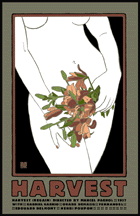

187 Harvest
Edition of 971 of which 125 copies are signed 1-125; 26 are signed A-Z as artist's proofs, 17 copies are signed as dedication copies and three sets are signed as progressives.
August 9, 2000 10 colors 16-1/2" x 24"
Clients: Self Promotion
Model: Sophie Maureen Aissen
1-125: Saint Hieronymus Press A-Z: Artist's own use
Dedication copies: Ruben & Barbara Aguilla; Sophie Maureen Aissen; Mary Aissen & Serge Froloff; Louis Shemin Aissen & Kindy Kemp; Michael and Mildred Aissen; Judith Aissen, Jim Clifford & Ben Clifford; Matthew Louis Aissen; Bob & Linda Altman; Eli Altman; Molly Altman; Nathaniel Altman; Claire Deem and Barbara Chisholm; Wanna Deem; Jake Hankamer; Patti & Tim Hyland; Grandma Joan Williams; Anne Williams & Johnny Dorsey; Lydia & Hector Zapana
Progressives: One set to Sophie Maureen Aissen,two sets to Saint Hieronymus Press.
Demeter, daughter of Cronos and Rhea, is the personification of Mother Earth, the goddess of agriculture and the civilization based on it. Her daughter, fathered by Zeus, is Persephone. As a maiden, while picking flowers, Persephone--with the connivance of her father--was abducted by Hades and carried off to his dark kingdom. Demeter wandered nine days over the earth seeking her daughter until on the tenth she learned the truth from the all-seeing Sun. In her wrath she made the earth barren, and was only propitiated when her daughter was returned and allowed to spend two-thirds of the year with her. Thus Demeter was worshipped not only as the goddess of agriculture, but of law, order and especially of marriage.
Persephone had, while in Hades' kingdom, eaten part of a pomegranate and become his wife, and could not fully return to the earth. In winter, she returned to her husband and reigned with him as the goddess of death. While with her mother, she was regarded as the virgin daughter, and the helper of the goddess who presides over the fertility of the earth. Hence, Persephone is emblematic of vegetable life, that comes and goes with the changing of the seasons. In spring, when the seeds sprout up from the ground, she rises to her mother; when the harvest is over, and the vegetation dies, and the seed is laid again in the dark grave of the earth, she returns to her subterranean kingdom.
In spring she was worshiped at the great flower festival in the Peleponnesus. In autumn, there was held in Attica the great wedding feast of her marriage with the god of the lower world. *
Farmers worship the many forms of Mother Earth and find in her daughter, the dying and resurrected goddess, a reflection of the wheel of changing seasons. In the miraculous life of the crops is your own life; in the Earth's fertility is your own fertility. A seed goes into the ground and depending on what kind of seed it was you get an ear of wheat, or an apple tree or a cabbage. Some things you plant once and they grow and keep on bearing for years. Some things you plant and they grow and you harvest them and then the next season you have to plant again with seed saved from last time. You can't, however, just stick some seeds in the ground and then sit back and relax until it's time to eat. Farming takes constant work and attention, or the weeds will take over and vermin will devour what little is left. Or an untimely frost comes and blasts the crop before it ripens, or hail flattens the nodding wheat or strikes the blossoms from the fruit trees, or there's not enough water and everything withers and dies or there's too much water and you can't plant in the first place. The harvest is the payoff. It means that you're going to get a chance to live for another year, unless something goes wrong.
A farmer's life is one of constant worry and pain, long days and holidays few or none. Feast or famine--either you have more of something than you can shake a stick at or nothing at all, and the animals come first and the farmer a poor second. You only eat a chicken when it's stopped laying, and a pig fed on scraps and acorns once or twice a year. Never as much bread and soup as you'd like, either.
And then there's the next crop of farmers to worry about. A seed is planted and grows into a new little mouth to feed, and the care and raising of children is even more demanding than the nurturing of plants. But you have no choice, life goes on whether you will or no. In between birth and death there come moments of beauty that light up the muddy darkness and for an instant make it all worthwhile. Then back to work. Might as well make the most of it. You only get out what you put in.
* Source for Persephone: "Dictionary of Classical Antiquities," Oskar Seyffert, Meridian, 1956